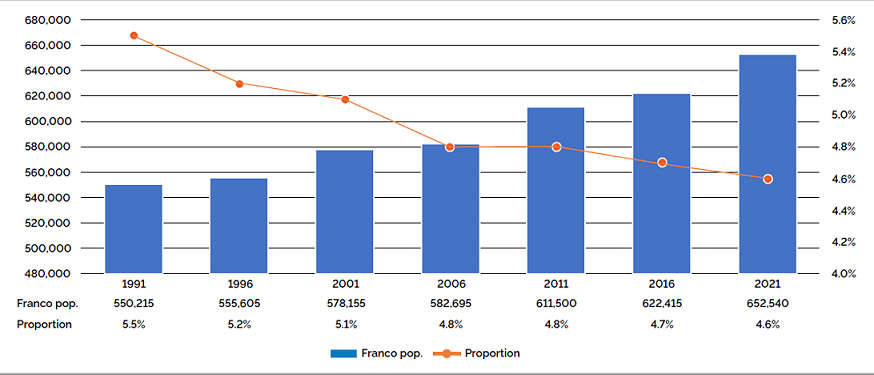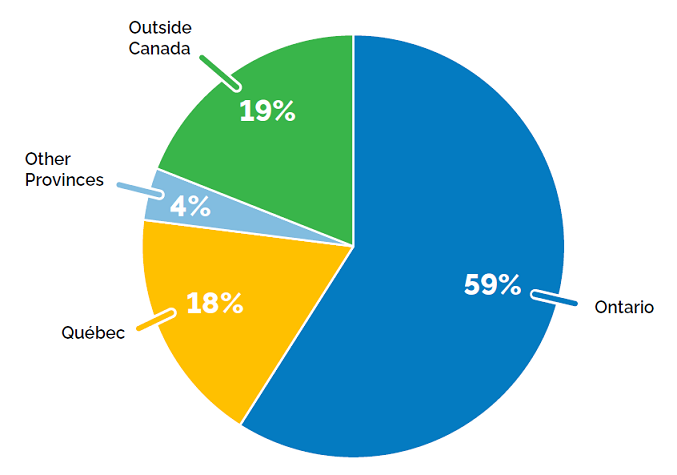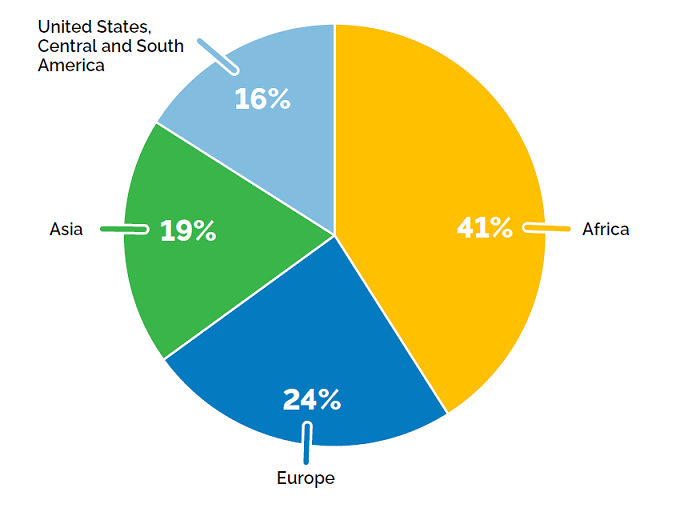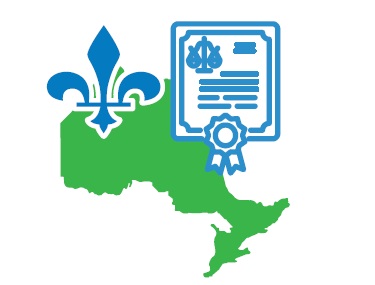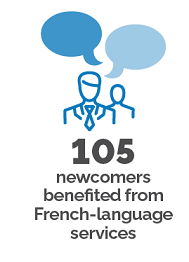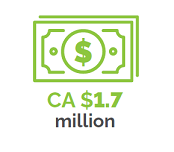2024 Report on Francophone Affairs
Read the 2024 report that highlights our efforts to support the social, cultural and economic development and influence of Ontario’s Francophone community.
Minister's Message
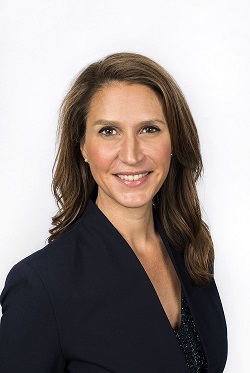
The Honourable Caroline Mulroney, Minister of Francophone Affairs
Mr. Speaker,
It is with great pleasure that I present this report on Francophone Affairs, which highlights our government’s achievements in supporting the social, cultural, and economic vitality of Ontario’s Francophonie.
This document is the result of a reinforced approach to planning and transparency. It is intended for the general public, particularly the Francophone population, whom we are committed to serving and supporting.
I truly hope that when Ontario’s Francophones read this report, they will agree that we are listening carefully and they will recognize the positive impact of our action on the growth and development of Francophone communities in the province.
These results are the culmination of a six-year sustained effort and reflect our government’s unwavering commitment to Ontario’s Francophonie, in close collaboration with Franco-Ontarians, whose determination and vitality remain a source of inspiration.
I would also like to reiterate my pride in the work we continue to do together and the progress we have made over the past year. It is undeniable that ensuring the success of Ontario’s Francophonie requires concerted action in all spheres of public life. In particular, I would like to acknowledge the invaluable support of the Premier and my Cabinet colleagues, and their efforts to support the objectives in priority areas for Francophones.
I would like to thank the Provincial Advisory Committee on Francophone Affairs as well as our partners from associations, the public, broader public and private sectors, other jurisdictions and civil society in general. Our achievements would not be possible without their support and collaborative efforts.
Our approach to Francophone affairs is based on two pillars: our French Language Services Strategy and our Francophone Economic Development Strategy. I am confident that these strategies and the measures in place to implement them, including the modernized French Language Services Act and the new Regulation on Active Offer, will ensure greater access to French services.
By supporting our Francophone communities and creating an environment conducive to their development, together we can build the Ontario of tomorrow.
The Honourable Caroline Mulroney
Minister of Francophone Affairs
Introduction
Mandate and Role of the Ministry
The mandate of the Ministry of Francophone Affairs is to ensure that all Franco-Ontarians receive government services in French, and to encourage their full participation in the social, economic, and political life of the province while honoring their linguistic and cultural heritage.
Inclusive Definition of Francophone (IDF)
In 2009, the Ontario government adopted a new and expanded definition of a Francophone to better reflect the diversity of its Francophone population. The Inclusive Definition of Francophone (IDF) includes those whose mother tongue is French, as well as people whose mother tongue is neither French nor English, but who have a good knowledge of French as an official language and who use French at home.
Previously, Francophones were defined according to mother tongue. The ‘mother tongue’ category only identified Francophones as those who learned French at home at an early age and who still understood French at the time of the census. The IDF is based on several census questions including those on mother tongue, language spoken at home and knowledge of official languages.
In 2023, the Ministry of Francophone Affairs worked with Statistics Canada to develop a demographic profile of Ontario’s Francophone population using this inclusive definition. The figures in this document therefore may differ from census data and reports published by other organizations or governments that do not use the same definition.
Francophone Demographic Profile in Ontario
According to the 2021 Census and the inclusive definition, Ontario’s Francophone population represents 4.6% of the province’s population, although it varies by region.
According to the inclusive definition, Ontario has 652,540 francophone residents in 2021. While it is true that in percentage terms, Ontario’s Francophone community remains a minority, the number of Francophones is growing. In fact, the number of Francophones in Ontario has increased by 30,125 since 2016.
Ontario’s Francophone Population
Francophone Population - by Region
| Region | Francophones according to IDF | Total population | Francophones as a % of Ontario's total population | Regional distribution of Francophone population (in %) | Regional distribution of total population (in %) |
| Ontario | 652,540 | 14,223,935 | 4.6 | 100 | 100 |
| East | 290,665 | 1,892,330 | 15.4 | 44.5 | 13.3 |
| Centre | 201,050 | 9,852,430 | 2.0 | 30.8 | 69.3 |
| Southwest | 35,675 | 1,689,660 | 2.1 | 5.5 | 11.9 |
| Northeast | 118,520 | 557,220 | 21.3 | 18.2 | 3.9 |
| Northwest | 6,630 | 232,295 | 2.9 | 1.0 | 1.6 |
| Toronto (included in the Central Region) | 65,925 | 2,794,355 | 2.4 | 10.1 | 19.6 |
Key Facts
- The largest concentration of Francophones in the province is in Eastern Ontario (almost 63%), with 44.5% in the Southeast and 18.2% in the Northeast.
- In Northeastern Ontario, around one in five residents is Francophone (21.3%).
- Although Francophones represent only 2.0% of the total population of Central Ontario, this region is home to 30.8% of the province’s Francophone population, a third of whom live in Toronto.
Place of Birth of Francophones - by Region
Place of Birth of Francophone Immigrants Born Outside Canada
Source: Statistics Canada, Census of Population, 2021 according to Inclusive Definition of Francophone
French Language Services
French Language Services Strategy
Background
Launched in November 2021, the fundamental objective of Ontario’s French Language Services Strategy is to improve the offer, accessibility and quality of French-language services that Ontario’s Francophones are entitled to.
Ontario’s French Language Services Strategy is based on three pillars:
- Modernizing the legislative framework, including the French Language Services Act
- Growing the Francophone and bilingual workforce
- Service planning and delivery
Active Offer Regulation
French-language services are a priority for the government because it is by improving access to these services that Francophones will flourish and continue to contribute to the province’s prosperity.
The modernized French Language Services Act has led to the creation of a new regulation listing nine concrete measures that organizations subject to the Act (ministries, agencies and third parties providing services on behalf of the government in designated regions) must put in place to ensure an active offer of services in French.
These new measures came into force on April 1, 2023, and require the offer of services in French to be communicated from the first point of contact between the service provider and the requester. The responsibility for identifying French-language services lies with the service provider, not with the Francophone seeking the services.
These new measures complement those already in place in organizations subject to the Act and take into account the public consultations held in June 2021, as well as comments received through the posting on the Regulatory Registry in fall 2022. They are also in addition to the existing requirements of the French Language Services Act.
Regulation on Active Offer
The regulation prescribes measures for implementing the active offer of services in French. These measures include:
- welcoming service users;
- electronic or pre-recorded messages intended for the public;
- signs, posters, information and documents intended for the public that relate to the services;
- the content of web pages and social media; and
- the implementation of processes to ensure that service users continue to receive the service in the language of their choice at each stage of the service, without having to request it again.
For more details, see O. Reg. 544/22: Active Offer of Services in French -Prescribed Measures. You can also view this new video, which provides examples of active offer implementation and explains the nine measures included in the regulation.
Examples of Active Offer Implementation
Ministry of Education
To provide better support for staff in designated bilingual positions, the Ministry’s French-Language Service Coordinators have developed a resource to enable front-line staff to respond quickly in French, by telephone and e-mail, and thus meet the requirements of active offer.
Ministry of Long-Term Care
In 2023-24, the Ministry funded the costs of translating training, signage, policy, and program materials for all long-term care homes, regardless of designation status. This three-year, $1 million project will enable Ontarians to access these resources in French.
Ministry of Infrastructure
New guidelines for construction signage in Ontario were published on December 4, 2023, and now require the installation of bilingual signs in French and English in designated areas.
Ministry of the Solicitor General
The Ontario Provincial Police (OPP), a division of the Ministry, announced that its Francophone officers will now wear a pin displaying the Franco-Ontarian flag, facilitating the identification of officers who can communicate in French with residents of the province. This initiative is part of active offer of French-language services.
Designations under the French Language Services Act
Since 1994, the designation process has ensured that Francophones in Ontario have access to government services in French. Designation is requested by service providers who wish to confirm their commitment to serving their Francophone clients in the language of their choice. All designated service providers are identified in Ontario Regulation 398/93.
Since 2022, the government has approved changes to 59 designated organizations as part of a continued process to update the regulation. This updated information includes, among other things, changes to the names of existing designated organizations or the ministries responsible for them.
Ontario has introduced a simplified designation process and a new digital platform to encourage providers to offer French-language services and apply for designation under the French Language Services Act. The Ministry of Francophone Affairs will soon add functionalities to the platform, including integrating the triennial evaluation process for agencies. These measures support Ontario’s efforts to update Ontario Regulation 398/93 on the designation of public service agencies offering services in French.
Progress in Key Areas
The Ministry of Francophone Affairs, together with its partner ministries, has made a lot of progress in implementing its government-wide Strategy for French language services.
Treasury Board Secretariat
As part of the province’s efforts to increase access to government services in French, the Ministry of Francophone Affairs and the Treasury Board Secretariat have launched the Ontario Public Service Bilingual Human Resources Initiative.
As part of this initiative, all public-facing Ontario Public Service job postings have been available in French since January 15, 2024. This new measure is another important step in the province’s efforts to increase access to government services in French, as it supports the building of internal bilingual capacity and the recruitment of diverse talent to better represent and serve the people of Ontario, thereby strengthening the government’s new Regulation on Active Offer.
Ministry of Education and Ministry of Colleges and Universities
Ontario’s French Teacher Recruitment and Retention Strategy (2021-2025), which aims to address the shortage of French and French as a Second Language (FSL) teachers in the French and English school systems, is continuing.
In 2023, the Ontario government:
- Funded 110 additional spaces within the Bachelor of Education program at the University of Ottawa and the Université de l’Ontario français (UOF) to train more French teachers. These spaces are in addition to the initial 40 spaces at the UOF, bringing the total number of spaces to 150 for the 2023-2024 school year.
- Maintained its support for the French teacher training program in technological education at the University of Ottawa, which produced its first cohort of graduates in summer 2023.
- Actively promoted the Enseigner en français en Ontario website and its recruitment portal La Passerelle - En route vers l’Ontario, which attracted more than 1,200 international applicants as of December 31, 2023.
Ministry of Tourism, Culture and Sport
Through its community grants, the Ontario Trillium Foundation, an agency of the Ministry, invested a total of $4,672,100 in 2023-2024 to support 46 projects benefitting Ontario’s Francophone communities. These applications were submitted in French, by Francophone organizations, or for the benefit of the Francophone community.
Ministry of Labour, Immigration, Training and Skills Development
The Global Talent and Settlement Services Division provides funding to Francophone organizations to deliver a range of services to help newcomers, including Francophones, learn English or French, settle, access training, and find jobs.
In 2022-2023, seven Francophone organizations received funding to provide assessment, information and orientation, case management, and referrals to employment and training services to Francophone newcomers in Toronto, Peel Region, Durham Region, Hamilton, London, Windsor, Ottawa, Timmins, York and Sudbury. More than 4,300 Francophone newcomers have benefited from this program.
Similarly, in the 2022-2023 school year, the Ministry provided funding to seven school boards (three French and four English) to deliver 318 courses in French as a Second Language (FSL) to more than 5,400 newcomers in Toronto, Ottawa, Halton, and Peel Region.
Ministry of the Attorney General and Ministry of the Solicitor General
The Ministry of the Attorney General and the Ministry of the Solicitor General, in collaboration with Francophone stakeholder organizations, have continued to collaborate on the strategic planning process for the development of French-language services to improve and modernize access to justice in French. The fourth strategic plan developed by the two ministries is aligned with the modernized Act and the new Regulation on Active Offer of Services in French, and will continue to guide the work of both ministries in collaboration with the Coalition of Justice Sector Francophone Stakeholders.
Ministry of Health
The Ministry of Health has updated its 2023-2028 strategic plan, which is based on three key strategic directions and three related objectives per direction aimed at increasing health equity for Ontario’s underserved Francophone populations through ongoing collaboration with key internal and external strategic partners.
The strategic directions are:
- improving access to French-language services across the continuum of care
- enhancing Decision-Making Enabled by Better Data
- strengthening Francophone Voices through better Engagement
Ministry of Long-Term Care
In March 2024, the government announced funding of over $2.5 million over two years to train up to 90 personal support workers (PSW) under the Learn and Earn Accelerated Program for PSWs in 2024-2025. This investment will allow existing French-speaking Long-Term Care home staff to become personal support workers while remaining in their communities.
This new program offered by Collège Boréal will improve the availability of French services in the province. Collège Boréal has partnerships with 26 long-term care homes in Ontario. Employees of these homes who speak French are eligible. The first cohort of students began in May 2024.
Canada-Ontario Agreement on French-Language Services
The Canada-Ontario Agreement on French-Language Services is a multi-year collaboration between the federal government and the province, designed to support the planning and delivery of French-language services for the Franco-Ontarian community.
This year, the two governments signed a new five-year agreement that includes an annual contribution of $4,000,000 for each of the four fiscal years from April 1, 2024, to March 31, 2028.
Examples of Initiatives in 2023 Funded Under the Canada-Ontario Agreement
Ministry of Transportation
Installation of signs displaying messages in French and English on delays at border crossings with the United States. This project will be completed later in 2024.
Ministry of Health
Support for training of Francophone child and youth mental health practitioners in Ontario.
Ministry of Tourism, Culture and Sport
Partnership between the Royal Ontario Museum (ROM) and three school boards (Conseil scolaire Viamonde, Conseil scolaire catholique MonAvenir and Toronto District School Board) to create a unique experience in French, including free school visits. As part of this project, the ROM also organized a Family Day on February 2, 2024, welcoming 973 French-speaking families.
Ministry of the Solicitor General
Improved recruitment, retention and professional development of correctional officers and staff for bilingual Ontario Provincial Police communications centres.
Ministry of Education
Development of professional training programs offered by the Association francophone à l’éducation des services à l’enfance de l’Ontario (AFÉSEO) on early learning and child care.
Francophone Economic Development
Francophone Economic Development Strategy
The Francophonie is a major economic asset for Ontario and deserves to be fully valued and supported. With this in mind, in 2021, the Ministry of Francophone Affairs launched its Francophone Economic Development Strategy, the result of close collaboration with partner ministries and the Francophone business community.
Since then, the Ontario government’s actions have aimed to strengthen the Franco-Ontarian economic ecosystem by, among other things, applying a Francophone lens to the provincial government’s various economic development programs.
The Francophone Economic Development Strategy is based on three pillars:
- Francophone entrepreneurship and innovation
- A skilled bilingual workforce: education, training and employability
- Promoting Ontario’s Francophonie as an economic asset
Support for Franco-Ontarian Social Enterprises and Community Organizations: Francophone Community Grants Program
The Francophone Community Grants Program (FCGP) aims to support the cultural and economic vitality of the Francophone population by focusing on improving front-line services and promoting French language and culture. With an increased budget of $2 million per year since 2021, the FCGP funds projects in a variety of fields, supporting community and social organizations, as well as businesses that offer services in French or serve Francophone markets.
The program has two funding streams for projects of up to $50,000 the Community and Culture stream and the Economic Development stream. In 2023-2024, the Ministry of Francophone Affairs selected 51 applications following a rigorous assessment, including 45 projects under the Community and Culture stream and 6 projects under the Economic Development stream.
Examples of Projects Selected for the 2023-2024 Francophone Community
Grants Program (FCGP)
“Impact ON (CCO) in Action: Investing for the Future!”
Impact ON offered workshops on revenue diversification through social entrepreneurship for Francophone non-profit organizations in Ontario. These workshops, offered in person and online, showed how to develop first products or services in Ontario’s francophone markets, taking into account local realities.
"Big Brothers Big Sisters of Leeds and Grenville (BBSLG) French mentoring initiative”
This project matched French-speaking volunteer mentors with young people from the French-speaking community to enable them to participate in the BBSLG program in French. The program focused on the most vulnerable children and young people in Leeds and Grenville.
“Developing the organizational capacity of the Carrefour ethnoculturel
francophone”
This project by the Centre communautaire régional de London, in partnership with the Association marocaine de London, the Association Canado-Congolaise de London, the Association culturelle Burundaise-Canadienne de London and others, aimed to improve the skills of eight French-language ethnocultural organizations by offering capacity-building workshops.
Support for Francophone Economic Development Through Partner Ministry Programsfootnote 1
Ministry of Labour, Immigration, Training and Skills Development
The Ontario Bridge Training Program addresses foreign qualification recognition barriers by helping highly skilled internationally trained immigrants access occupation specific training, licensure supports, mentoring and work placements to find jobs that align with their international education and training.
In 2022-2023, 105 Francophone newcomers benefited from Ontario Bridge Training Program French-language services.
Ministry of Economic Development, Job Creation and Trade
Under the Regional Development Program - Eastern Ontario Development Fund and Southwestern Ontario Development Fund 2022-2023, $1.7 million has been allocated to Francophone projects, to support economic development agencies, sector associations and consortiums.
Ministry of Colleges and Universities
In 2022-2023, the federal government granted the Ministry of Colleges and Universities $498,388 over two years to help Collège La Cité renovate a multi-purpose laboratory specializing in culinary innovation and mixology. This project will enable La Cité to improve and expand its course offerings in its hospitality and tourism programs. The state-of-the-art laboratory will also serve as a venue for promotional workshops for secondary school students.
Enhanced Envelope to Support Long-Term Francophone Economic Development
In 2023, the Ontario government strengthened its support for entrepreneurs, and in particular new Francophone businesses, by annualizing a financial envelope of $800,000 to support Franco-Ontarian economic development across the province and beyond its borders.
This funding, an increase of $300,000 over the previous year, has been invested in two areas:
- $500,000 to support the Franco-Ontarian economic ecosystem and the range of services offered to Francophone businesses and entrepreneurs;
- $300,000 to promote Ontario’s Francophonie as an economic asset.
The Fédération des gens d’affaires francophones de l’Ontario (FGA)
In 2021, the government granted a start-up investment to support the development of an Ontario Francophone business network, now the Fédération des gens d’affaires francophones de l’Ontario (FGA). The Fédération is one of the three Canadian members of the Alliance des patronats francophones and one of the four founding members of the new Alliance de la francophonie économique canadienne (AFEC) announced at the Sommet de la francophonie 2022.
The FGA received $295,000 in funding in 2023-2024 to:
- conduct an in-depth study of the needs of Francophone businesses and entrepreneurs;
- provide referral, consulting and training services to Francophone entrepreneurs in a minority context; and
- mobilize businesses through initiatives such as the Forum franco-ontarien des affaires.
The Ministry also funded the following two FGA-member organizations to strengthen Francophone entrepreneurship:
- ImpactON received $150,000 to help four cohorts of women entrepreneurs carry out their business projects and to help two cohorts of first-time exporters access interprovincial, international and domestic markets.
- The Société économique de l’Ontario (SÉO), in collaboration with partner organizations, received $100,000 to develop business start-up learning modules for Francophones, newcomers and new farmers.
New Annual Investment of $300,000 to Increase the Promotion of Ontario’s Francophonie as an Economic Asset at the National and International Levels
In 2023, this new envelope enabled Ontario to fund Avantage Ontario, among other initiatives, to promote Ontario as a destination of choice for Francophones, and to prepare Ontario’s participation in national and international economic forums planned for 2024 with a view to promoting Francophone businesses and facilitating partnerships with other Francophone jurisdictions.
Promoting the Francophonie Nationally and Internationally
Ontario-Québec Program
In an effort to collaborate and support Francophone economic development, the governments of Ontario and Québec are each investing $250,000 per year under the Cooperation and Exchange Agreement between the government of Québec and the government of Ontario with respect to the Francophonie.
The goal of this program is to support projects developed jointly by Francophone organizations in the two provinces and is intended to:
- encourage the development of Francophone culture
- take advantage of economic opportunities related to the Francophonie
- improve mutual understanding between the two provinces
In 2023-2024, Ontario selected 11 projects developed jointly by Francophone organizations in the two provinces, particularly in the fields of education, culture and research, as well as the economy, innovation and regional development.
Examples of Projects Funded by the 2023-2024 Ontario-Québec Program
Québec-Ontario trade and networking missions
Trade missions for Québec and Ontario entrepreneurs to network with their counterparts in Québec and Ontario for business development. Missions commerciales de l’Université Laval and the Société économique de l’Ontario have organized trade missions and networking activities between Francophone business communities to promote exchanges and strengthen business ties. This collaboration will continue over three years.
Jeune FRANCO Ontario-Québec cultural exchange
The initiative gave Francophone youth in Ontario and Québec aged 13 to 16 the chance to enjoy a wide range of cultural experiences on specific themes to help promote French-language. Each youth was paired with a partner from the other province and interacted through virtual workshops on a variety of topics.
Inter-university research collaboration in Canada’s Francophonie
Acfas has launched the Programme de coopération en recherche dans la francophonie canadienne, which offers mobility grants of up to $5,000 to established researchers or students to carry out research in another Canadian province or territory.
The Ontario-Québec Francophonie Trade Award
This initiative, which was developed to support small and medium-sized Francophone businesses, recognizes excellence in businesses that have distinguished themselves on an interprovincial scale through their impact and trade between Québec and Ontario.
The award, whose winners were announced at the Franco-Ontarian Business Forum (Forum franco-ontarien des affaires) of the Fédération des gens d’affaires de l’Ontario in April 2024, strengthens business and other ties between the two provinces, and encourages entrepreneurs to explore new markets and develop their provincial, national, and international presence by exporting their products and services.
2023 Winner for Ontario: Escouade multimédia (Hawkesbury, ON)
Escouade multimédia has been specializing in multimedia production and the delivery of online learning experiences for over 20 years. Their mission is to help people deliver the best in multimedia production and online events. This team of specialists offers advice on animation strategy and an innovative approach focused on the user experience.
2022 Winner for Ontario: Ferme Avicole Laviolette (Saint Isidore, ON)
The farm produces top-quality eggs in the Prescott-Russell region and increased its capacity, including additional facilities and a high-tech grading station that allows it to meet demand of grocery stores, restaurants and food wholesalers. Employees serve customers in French or English on both sides of the Ontario/Québec border.
2021 Winner for Ontario: Kyan Cuisine Inc. (Embrun, ON)
The company sets itself apart by producing and delivering plant-based meals in the Prescott-Russell, Ottawa and Outaouais regions. It strives to offer ready-to-eat vegan food and meals that are both healthy and delicious, based on what it offers in local grocery stores, its online platform and through home delivery.
Rencontre des entrepreneurs francophones
This annual meeting of French-speaking entrepreneurs brings together business leaders, investors, representatives from the business world and political leaders. By creating favourable conditions for doing business in French, in a spirit of national and international collaboration, Ontario aims to showcase the cultural vitality and socio-economic know-how of these Francophone entrepreneurs.
In June 2023, the Minister of Francophone Affairs took part in the 3rd edition of the meeting, during which she reiterated the Ontario government’s desire to participate in exchanges that will help shape a promising future for Ontario’s Francophonie.
Collaboration with New Brunswick: A Francophone Component at the Toronto Global Forum
The Toronto Global Forum (TGF) brings together international thought leaders from business, government and civil society to discuss key global challenges and opportunities.
In 2023, Ontario collaborated with New Brunswick and the Ministers’ Council on the Canadian Francophonie to include a Francophone component within the Forum’s program. The forum’s theme “Fostering Economic Resilience” included topics such as inflation, environmental priorities and the digital transition.
Ontario’s Minister of Francophone Affairs moderated a panel before an audience of nearly a hundred delegates, entitled “Leveraging French Bilingualism in Talent War”. Her participation also enabled her to contribute her expertise on the impact of bilingualism on the growth and development of Canadian businesses.
The discussions highlighted Ontario’s strengths in terms of bilingualism and workforce. The message was clear: businesses and organizations must harness the power of linguistic diversity to attract and retain the best talent, innovate and grow in international markets.
Memorandum of Understanding between the Province of Ontario and the French Community of Belgium
On November 20, 2022, the Minister of Francophone Affairs and the Minister-President of the French Community of Belgium signed a Memorandum of Understanding to support cooperation and exchanges between Ontario and the Fédération Wallonie-Bruxelles in the areas of higher education, culture, research, digital media, youth, francophone entrepreneurship and the promotion of the French language.
As part of the implementation of this agreement, the Ministry of Francophone Affairs has granted financial support to Avantage Ontario to enable it to deploy its efforts in Belgium in 2023-2024 to promote higher education in Ontario to secondary school students and their parents, and to inform students at Belgian higher education institutions about opportunities for graduate studies.
Avantage Ontario facilitated the signing of an agreement between Ontario’s Université de Hearst and Belgium’s Haute École Lucia de Brouckère, in part by funding Université de Hearst’s mission to Belgium in November 2023. Among other opportunities, this agreement will enable both institutions to involve their students in study, training, research and internship programs.
International Presence of Ontario’s Francophonie
Ontario is an observer member of the Organisation internationale de la Francophonie (OIF), an institution dedicated to promoting the French language and political, educational, economic, and cultural cooperation among its 88 member states, including Canada and Belgium. The OIF and the Memorandum of Understanding between the Province of Ontario and the French Community of Belgium are strategic platforms for showcasing Ontario’s Francophonie worldwide.
Promoting Ontario’s Francophone and Bilingual Tourism Industry
One of the pillars of the Ontario government’s Francophone Economic Development Strategy is to increase Francophone tourism through specific strategies and coordinated promotional efforts.
In 2023-2024, the Ontario Government, through the Ministry of Tourism, Culture and Sport, invested over $385,000 in several programs to support the preservation and recovery of Ontario’s Francophone and bilingual tourism industry.
Francophone festivals showcase the vitality of the Francophonie and contribute to the province’s economic growth by attracting audiences from Ontario and beyond.
In 2023-2024, Experience Ontario supported eight Francophone festivals and events for a total of $305,957:
- Festival Franco-Ontarien
- Festival de la Curd St-Albert Inc.
- Multicultural Festival and Canada Day
- Franco-Fête de Toronto
- Cinéfranco Festival Grand Public
- FrancoFEST Hamilton
- Festival Les Compagnons
- Corporation of the Casselman Downtown Revitalization - Christmas Lights
In addition, the Ontario Cultural Attractions Fund provided $80,000 for the marketing and promotion of two Francophone events that took place in 2023:
- Northern Lights Festival Boréal
- Festival Franco-Ontarien – Le Parcours du Franco
Conclusion
The Francophonie is a key asset for Ontario, making a significant contribution to its economic and sociocultural vitality and wealth.
The progress made in 2023 clearly demonstrates the government’s firm commitment to the well-being of Ontario’s Francophone population. The province’s strategic approach is designed to generate promising and sustainable results for the overall development of Ontario’s Francophonie and to promote its expertise at the national and international levels.
Ontario is doing everything it can to enhance the quality of life and ensure growth of its Francophone communities while promoting the growth and vitality of the province as a whole.
Footnotes
- footnote[1] Back to paragraph The data presented in the above section is based on results for fiscal year 2022-2023, being the most recent available at the time of writing and publication of this annual report

